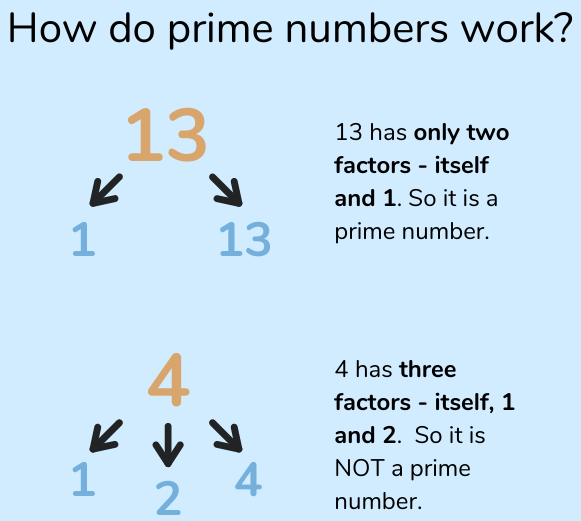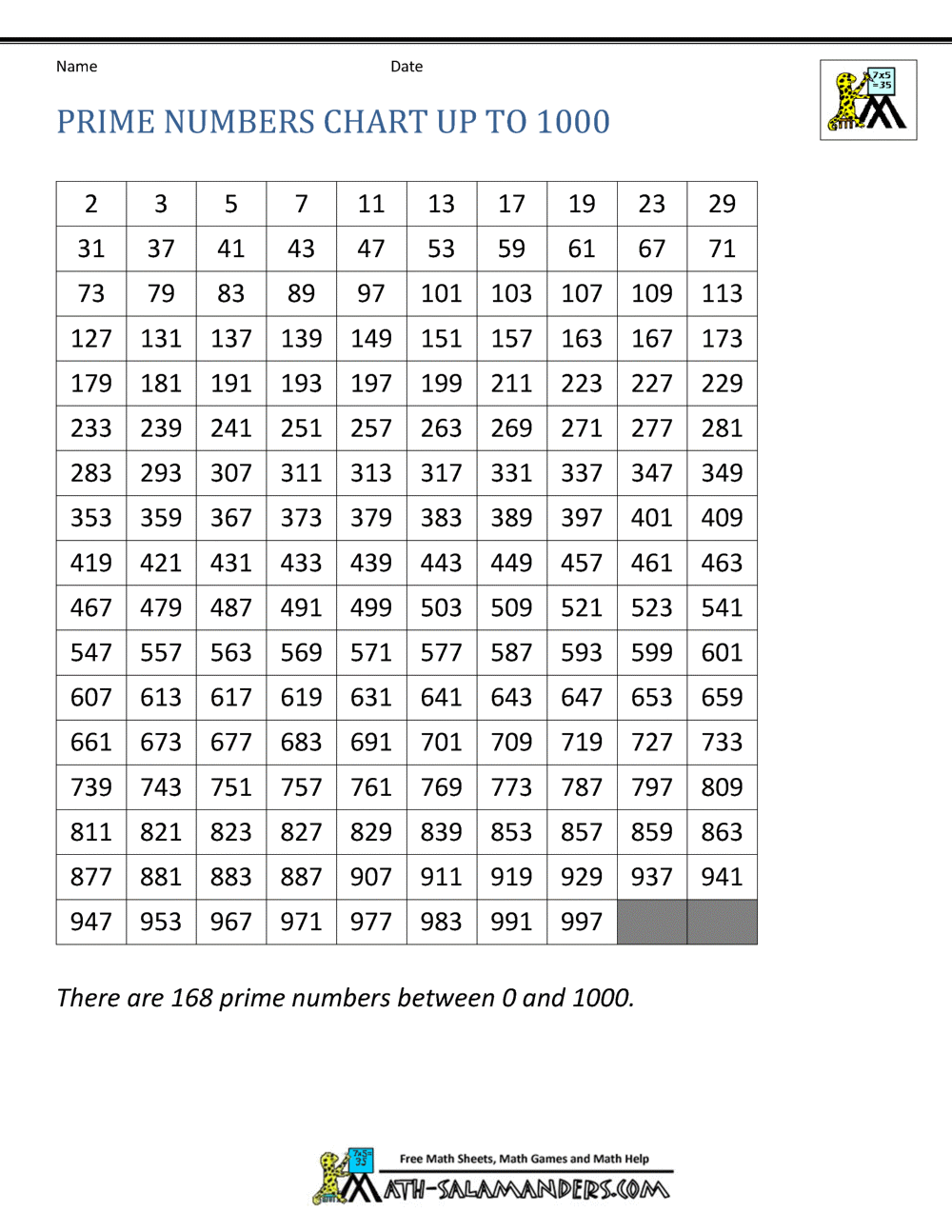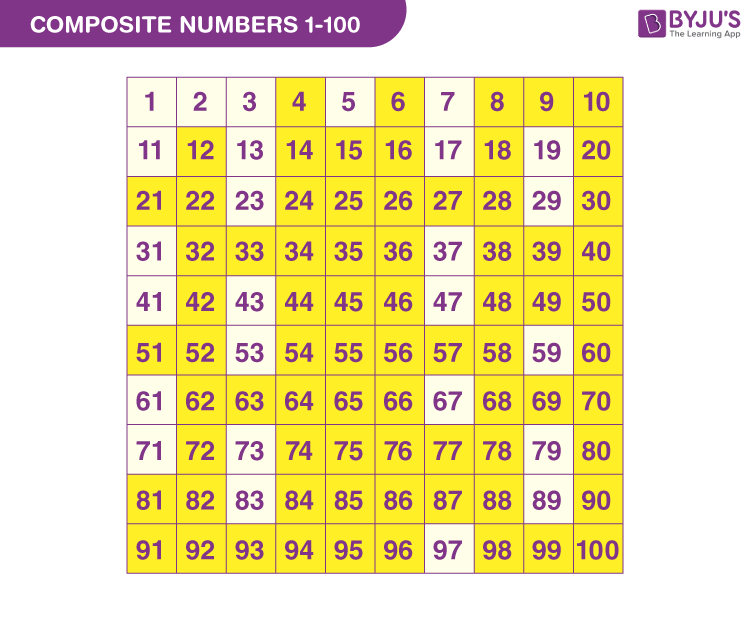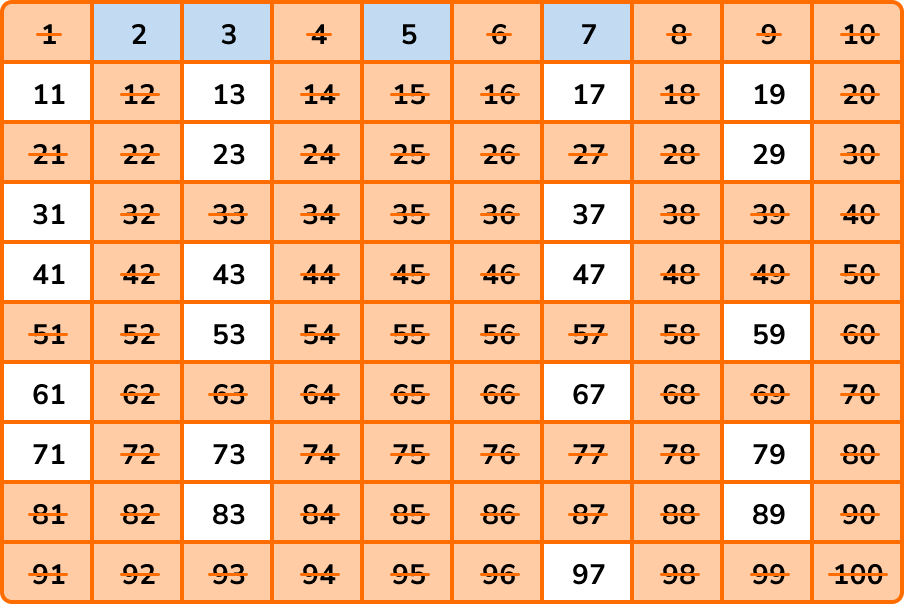
Prime Numbers Worksheet Grade 6 Numeracy Prime Number vrogue.co
Is 8 a Prime Number? No, because it can be made by 2×4=8; Is 73 a Prime Number? Yes, as no other whole numbers multiply together to make it.

What Is the Sum of the First 10 Prime Numbers
Step 1. Make sure it is a counting number greater than \hspace {0.2em} 1 \hspace {0.2em} 1. And that it isn't a perfect square. Or else, the number cannot be prime. \hspace {0.2em} 97 \hspace {0.2em} 97 passes this test. Step 2. Think of the largest number whose square is less than the given number.

A list of prime numbers from 1 to 100 aleneloX
Thus 11, 31, 37, 53, and 61 are prime numbers. Method 3. It is used to find prime numbers greater than 40. If a number greater than 40 can be expressed as (m 2 + m +41), m = 0, 1, 2,. it is a prime number. For example,. Co-prime Numbers: A pair of numbers are co-prime to each other if their Greatest Common Factor (GCF) is 1.

List Of Prime Numbers
Since we see that 61 has only two factors, 1 and 61, then we can come to the conclusion that 61 is a prime number. Another way you can look at the problem is by the factors of 61. By no coincidence, 61's factors are just 1 and 61 (only just itself and 1), which is the definition of a prime number.

Prime Numbers
A prime number is a natural number greater than 1 which has only two factors, 1 & the number itself. Learn the definition, examples, lists, facts, & more.. Prime numbers between 60 and 70: 61, 67: Prime numbers between 70 and 80: 71, 73, 79: Prime numbers between 80 and 90: 83, 89:

Is 61 a Prime or Composite Number? YouTube
Yes, 61 is a prime number. Prime numbers are numbers greater than 1 and only have two factors: 1 and the number itself. The number 61 has only two factors, 1 and 61, so it meets the definition of a prime number. Prime Numbers between 1 to 100: Rule to check Examine whether the given number is divisible by any prime number less than 11, i.e. 2, 3, 5, and 7.

What is Prime Number? Program to Check a Number is Prime or Not Tutorial 4You YouTube
This prime number calculator will find if a number is prime or composite. If it is composite the calculator will also find all of the factors of the composite number. Factorization or decomposition of composite numbers can be done on the Factoring Calculator . Test for a prime number for any integer, or whole number, less than.

prime numbers chart counting to 1000 by 10s chart ctp5620 math charts and posters for
61 is Prime. 61 has only two divisors 1 and 61. Hence it is a prime number. A prime number is an integer which has only two divisors number 1 and itself. Find out whether a given number is prime?

Is 61 a Prime Number Is 61 a Prime or Composite Number?
Now the question is whether the number 61 is prime or not. Yes, 61 is a prime number. By the definition of prime numbers, if a number has only 2 factors, i.e. 1 and the number itself, then it is a prime number. If the number has more than 2 factors, then it is called a composite number. How is 61 a Prime Number? To understand how 61 becomes a.

What is a Prime Number More Math For Kids, Fun Math, Math Games, Math Activities, Math
For example, the two prime numbers below 61 are: 53 and 59; and the two prime numbers above 61 are: 67 and 71. A composite number is a natural number that has proper factors. As we saw, 16 has several proper factors, thus it is a composite number. Why is 61 a prime number? Number 61 is prime because it doesn't have proper factors.

Identify the Prime numbers 11, 21, 31, 41, 51, 61, 71, 81, 91
Is 61 a prime number? It is possible to find out using mathematical methods whether a given integer is a prime number or not. For 61, the answer is: yes, 61 is a prime number because it has only two distinct divisors: 1 and itself (61). As a consequence, 61 is only a multiple of 1 and 61. Find out more:

Imagenes De Numeros Compuestos
A prime number is a natural number greater than 1 that is not a product of two smaller natural numbers. Therefore we consider 61 as a prime number, because: 61 is a natural number greater than 1, 61 is not a product of 2 smaller natural numbers (it can be divided only by 1 and itself)

Prime Numbers GCSE Maths Steps, Examples & Worksheet
A prime number (or a prime) is a natural number greater than 1 that is not a product of two smaller natural numbers. A natural number greater than 1 that is not prime is called a composite number. For example, 5 is prime because the only ways of writing it as a product, 1 × 5 or 5 × 1, involve 5 itself. However, 4 is composite because it is a.

Prime numbers and HCF worksheet Teaching Resources
A prime number is divisible only by itself and 1. There are 25 prime number less than 100. A prime number is a natural number that can only be divided, without a remainder, by itself and 1. In other words, a prime number has exactly two factors. For example, 13 is only divisible by 13 and 1. In contrast, a composite number is a natural number.

Prime Numbers Poster Tiger Moon
Learn to Code. Calculator. Is 61 a prime number? [SOLVED] Answer. 61 is a prime number. Related links: Is 61 a composite number? Is 61 an even number?

List Of Prime And Composite Numbers 1 1000 From To 000 Swiflearn
A prime number is a natural number greater than 1 that has no positive integer divisors other than 1 and itself. For example, 5 is a prime number because it has no positive divisors other than 1 and 5. In contrast to prime numbers, a composite number is a positive integer greater than 1 that has more than two positive divisors. For example, 4 is a composite number because it has three positive.
- มหา เวทย ผน กมาร ภาค 2
- How Much Is A Perm In Australia
- Everton F C Vs Tottenham Standings
- Bachelor Of Science Bachelor Of Engineering
- St Vincent S Private Maternity Melbourne
- Ulun Danu Temple Bali Indonesia
- Deep Fake Neighbour Wars Sbs
- What Time Is In Laos
- Trains And Cranes Super Tower
- Australian Cafe New York City
